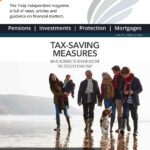A revolution in pensions transformed the retirement prospects for millions following the passing of the Pension schemes Act 2015. April 2019 is the fourth anniversary since the introduction of the pension freedoms, a fundamental change in the approach to retirement savings.
Announced by the then Chancellor, George Osborne, in Budget 2014, pensions freedoms gave over-55s full control of their retirement savings. The changes which commenced on 6 April 2015 gave individuals with a defined contribution pension the freedom to access their pension as they wished from age 55. Under these changes, those with a defined contribution pension scheme are no longer required to purchase an annuity.
Income in retirement
With a defined benefit contribution pension, you build up a pot of money that you use to provide an income in retirement. Unlike defined benefit schemes, which promise a specific income when you retire, the income you receive from a defined contribution pension depends on the amount you contribute, how investments perform and the choices you make at retirement to take an income.
At the time of the introduction of pension freedoms, the then Minister for Pensions, Steve Webb, said, ‘The passing of this Act marks the culmination of a five-year pensions revolution under this coalition government. While for years, successive governments simply watched the slow decline of the final salary scheme, we have responded by giving firms new ways of providing their staff with secure pensions.
There is a real appetite from employers to offer high-quality pensions for their staff, and the new Defined Ambition pensions made possible by this Act will enable a new generation of better, fairer schemes. The Act also protects the new pension freedoms flexibilities, so people have control of their pension pots, and know it is a criminal offence for scammers to pretend to offer official Pension Wise guidance.
Biggest shake up
To date, the introduction of pension freedoms has been the biggest shake-up of the pensions market and has given individuals control of over how to use their retirement savings, but a number of unintended consequences have emerged. Retirement savers have accessed approximately £17.5 billion through pension freedoms since reforms were introduced in April 2015, according to data from HM Revenue and Customs (HMRC). Its report, Flexible payments from pensions: July 2018, also found that the number of individuals who have received flexible payments from their pensions between the second quarter of 2017 and the first quarter of 2018 is 375,00.
This is compared to 393,000 individuals between the second quarter of 2016 and the first quarter of 2017, and 232,000 between the second quarter of 2015 and the first quarter of 2016. Since the introduction of pension freedoms in April 2015, approximately 1 million individuals have accessed their pension for flexible payments.
Between April and June 2018, 574,000 payments were received by the 264,000 individuals, totalling £2.3 billion. This compares to 500,000 payments to 222,000 individuals in the first quarter of 2018, at a total of £1.7 billion. From October to December 2017, 454,000 payments were made to 198,000 individuals, totalling £1.5 billion. Between April and June 2017, 435,000 payments were made to 198,000 individuals, amounting to £1.6 billion.
Reforms gathering pace
Previously, most pensioners purchased an annuity with their retirement pot, which paid a guaranteed income for life. The pension freedoms now allow those over the age of 55 access to their savings and give greater flexibility over retirement funding. Despite some isolated cases of pensioners spending their savings on fast cars and other luxuries, figures from HMRC signal that the reforms are gathering pace.
According to Prudential, around one in ten (11%) workers aged over 55 have found pension freedoms have encouraged them to save more since the rules came into effect. In the last three years, this group said they had started saving into a pension for the first time, encouraged their partner to save more, increased pension contributions or restarted pension saving since the introduction of the pension freedom rules.
According to the research, which surveyed 1,000 UK adults aged over 55 in February 2018, one in eight (12%) expected to work past their original planned retirement date. How your future looks will ultimately be determined by having the right vehicle in place for your retirement.
Taking your money
As you approach retirement and start thinking about when and how to take your money, it’s important to obtain professional advice to check what pensions you have and what they might give you. The rules around pensions are continuously changing, which means receiving regular advice will ensure you’re investing your pension effectively.
The concept of an ‘ageing population’ may feel overused, but the fact is that advances in medicine and generally improving living standards are combining to increase how long we can expect to live. The backdrop to this is a tightening of the welfare state, including the basic State Pension.
Retirement should be the best time of your life, when you can relax and enjoy your life by reaping the benefits of what you can earn in so many years of hard work. To keep yourself and your finances in good shape, start planning today. We can help create a clear picture of what you need so that the best is yet to come. For more information please contact one of our independent financial advisers.










Follow us